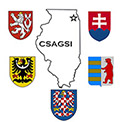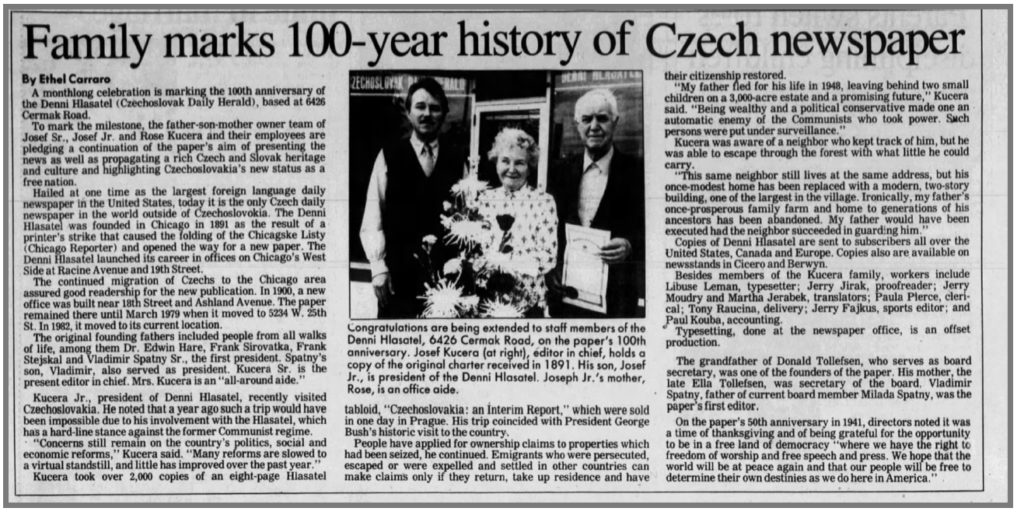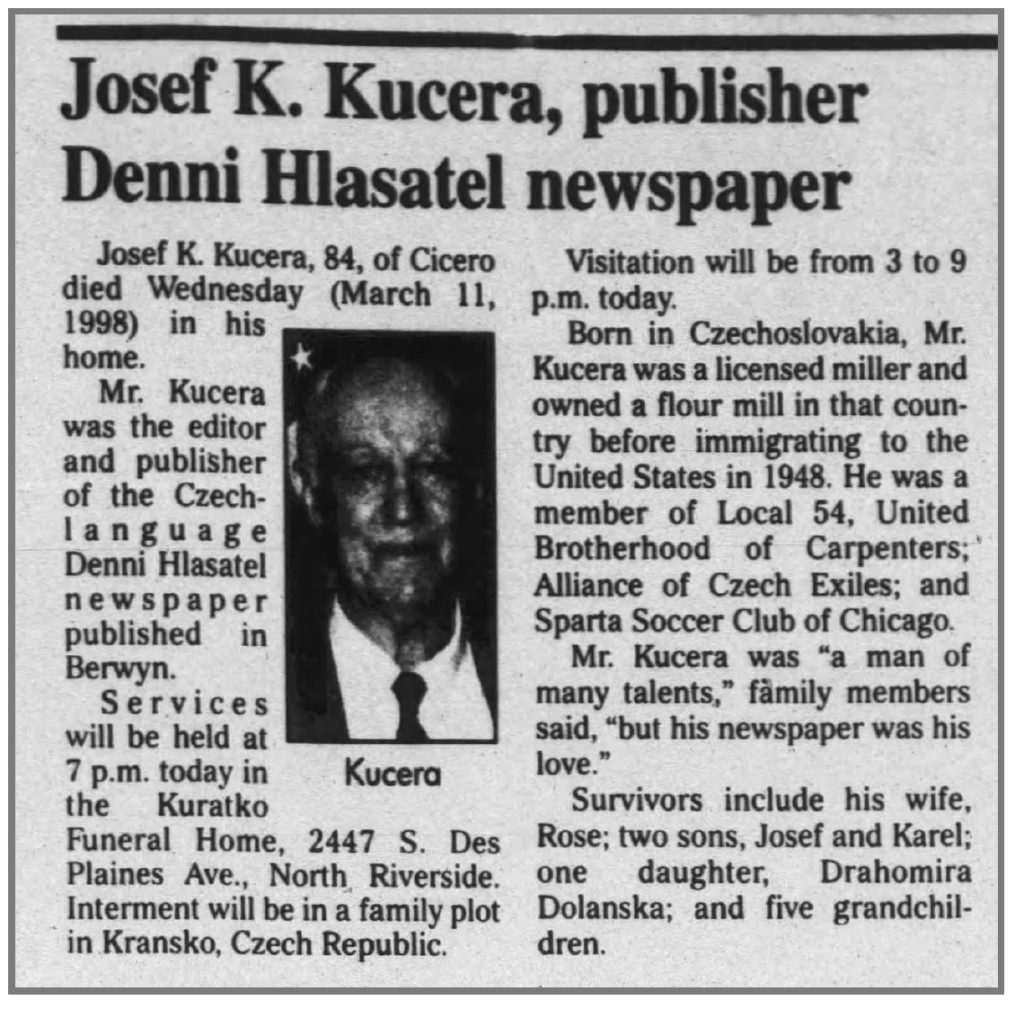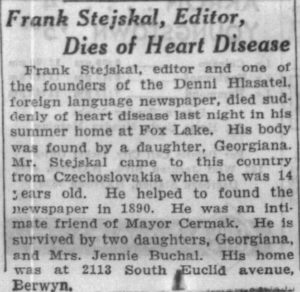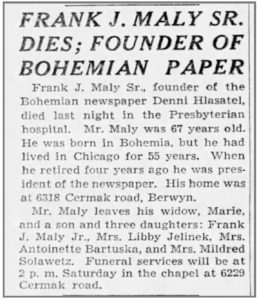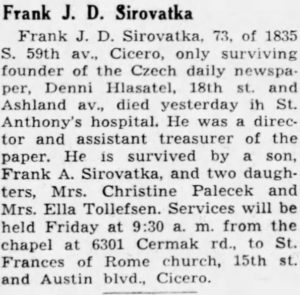Denni Hlasatel - The Newspaper
Information, Images, And Stories We Have Found
The Beginning
https://chroniclingamerica.loc.gov/lccn/sn82002660/
Library of Congress (above address) Library of Congress credits information to the University of Illinois at Urbana - Champaign.
Týdenní hlasatel
Týdenní hlasatel (Weekly Herald) is the weekly counterpart to the daily newspaper Denní hlasatel. Denní hlasatel (Daily Herald) was founded in Chicago in 1891, as a result of a typesetters' union strike. The weekly was founded in 1892, with its first release on December 15th.
The typesetter's union, founded on December 7, 1890, demanded shorter working hours and increased wages. After their demands were rejected, causing a strike, there were no employees to print newspapers for two days. Responding to this lack of newspapers, the typesetter's union started its own -- Denní hlasatel – which quickly gained popularity after its May 4th, 1891 release.
Týdenní hlasatel, like its daily counterpart, was dedicated to the interests of Czech-American workers. It was directed by workers themselves and its subscribers grew larger in number than well-established Czech newspapers such as Chicažských Listů (The Chicagoan Newspaper). By 1893, the paper had spread greatly and introduced a weekly system of fee collection that replaced their yearly subscription payments. In 1904, the publishers formed the Denní hlasatel Printing and Publishing Company.
In comparison to the daily, the weekly was twice as long (16 pages instead of 8). While the daily's content ranged from international news to letters to the editors and advertisements, the weekly maintained a narrow focus on news – local, national, and international. The weekly also featured a section detailing news related to Czech settlement in Americaas well as long sections of creative works, such as poetry, short stories, and novel excerpts. Interestingly, and in great contrast to the early issues of Denní hlasatel, Týdenní hlasatel did not feature any editorials, letters to the editor, or even advertisements.
The paper ran until 1994. At the end of its publication, it was the oldest Czech language daily newspaper in the world and had proven to be one of the most significant compatriot newspapers of the pre-World War II war period.
1900 - Svornost and Denni Hlasatel
"Local Notices. Standpoint of an Editor. Editorial.
From the time when in Chicago cheap Bohemian newspapers appeared with cheaper contents, there was exerted a pressure on our publication, Svornost, with the demand to lower our prices. This would be impossible, should Svornost remain for the future a newspaper with carefully prepared contents, as it has until today. In the meantime while other cheap publications were filled with insignificant reprints, our readers always found in the columns of Svornost, contemporary, carefully selected information about our overworked people, the newest correspondence from our staff members from almost all parts of the United States. The decent publication of this kind of newspaper, with other necessary expenses, made the expenditure so great that the editor was absolutely unable to lower the prices. The other publications, not having such high expenses, were not able to stand the competition any other way than by being cheap. In the last few years the Svornost has almost doubled in publication and when it was more and more voiced by our enlightened workingmen that they would subscribe willingly to Svornost in preference to other pseudo-workingmen's news, were they able to pay the same price, the administration conforming with the public desire, decided to lower the price.
Starting the coming Sunday, March 25, Svornost will cost ten cents per week and its contents will not be of less value or less carefully chosen. Willing to give to the readers, always, the latest news and information and the best articles and editorials, the management of the Svornost governed themselves by the example of principal English newspapers and German workingmen's news, such as the Arbeiter Zeitung; we installed, at great expense, electrically propelled new linotypes and presses which will help extensively to lower the price of our publication.
Lately the publication Denni Hlasatel which is a member of a pseudo-union, started a secret and even a public fight against Syornost for not belonging to the union. We like to explain correctly the relations of Bohemian publications with the Typographical Union. The Svornost has nothing against the union and if somebody really is a friend of workingmen, that is the editor of Svornost, Mr. August Geringer, and believe me his start in the newspaper business was much harder than of any one of those fops on Ashland avenue and 18th street, who try to be the Messiahs of Bohemian typesetters for the Bohemian workingmen.
The editor of Svornost has nothing against his employees belonging to the union, but if they are not able to become members of the union - the cause of it is again Hlasatel. We have proved already to the Bohemian citizens that there is no doubt that Hlasatel is in no way a cooperative nor a regular stock-company employing the stockholders. It is simply a case of the bosses and employers of Hlasatel being at the same time the bosses in the union of Bohemian printers where all rascals are against Svornost. Nobody has heard as yet of a union where the employers were workingmen at the same time. So long as the employers and bosses of Hlasatel can be the members of the Bohemian Printers' Union, this kind of a union can never be regarded as an honest and solid workingmen's union body.From the moment of resignation of all bosses and stockholders of the incorporated firm, Denni Hlasatel, from the union, this union will start to be an honorable workingmen's union.
When Svornost installed the new linotypes and setting machinery, the personnel of Hlasatel started to gossip the news that, at least, half of our typesetters must be laid off, but nothing like that has happened and none of the setters 4was dismissed. On the contrary, the editor of Svornost, a man always sympathizing with the workingmen, divided the setting personnel in two parts and gave to everyone an eight-hour a day job. In this regard our workingmen have a real advantage over the union workingmen of Hlasatel, National Press, and other printing shops where union conditions exist on paper only, and where a union man, to get along, must work hard and long into the night to obtain the exceptional pay as determined by the union. Where it happens in a union printing shop that the bosses are union members too, nobody has control of it and it is easily silenced.
Should Mr. Geringer have union workingmen and abuse them the same way as Hlasatel or National Press, all the Bohemian citizens aroused by the union and its bosses would rise against him.
The typesetters of Svornost are working a straight eight-hour day and their weekly payroll is absolutely higher than if they would be paid according to the union rates.
The best proof of this was when, not long ago, our manager appointed two union typesetters to help us out and gave them a salary conforming with the union scale. Neither of them, even working hard, was able to earn as much as the average wages of our typesetters. And it is a public secret that none of the so-called Bohemian Union printing shops is paying according to union scales, which are only on paper for publicity. These two boys are the best witnesses of the conditions which rule Svornost. They have assured our management that they will work willingly each time, should we need help; they stated further, that the Svornost printing shop is the best and most perfect of all they have worked in and that everything gossiped by the stock-holders about Mr. Geringer and his staff of co-workers is untrue and an un-founded lie. We must add that the said two typesetters were not any irresponsible boys but experienced workers.We are in doubt if the Bohemian Printers' Union could offer better working conditions than Svornost does, giving to its workers an eight-hour day and bigger wages than the union scale offers. In spite of this our workingmen are willing to join the union the moment the rich stockholders and proprietors of Hlasatel will resign as illegitimate members.
The purchase of the machinery by Svornost is of a big advantage to our workingmen and our present and future patrons because our typesetters get a shorter day of work, the same good wages and our patrons a cheaper newspaper.
We hope that the Bohemian citizens will acknowledge our position and appreciate our efforts for the benefit of the reading public and for the purpose of justice in working conditions in the Bohemian printing shops.
The editor of Svornost was not the cause of our not wanting to join the union, but the real cause was the deceit of the stockholders of Denni Hlasatel, their bosses and pseudo-union-men. All the time, during this union fight against our paper, nobody else tried to rouse the prejudice and mistrust among the educated and intelligent people toward our paper, but only Hlasatel with the help of its stockholders and employers.
We are asking our patrons to take everything previously said into consideration and remember that this newspaper will cost in the future ten cents only, and their desires will be fulfilled, then you will have a long-expected, widely read, excellent, and cheap Bohemian newspaper in the United States, for a 7smaller prices than any insignificant paper filled with unworthy reprints from old country papers, and representing different political humbugs."
1901
Typesetters' Union Makes New Demands
Some of our Typesetters have disregarded the agreement of a week ago, and now come forward with a new demand.
We are particularly blessed by people who like to share. Eight years ago members of a literary society, requested that we turn our business over to them. We served these impudent applicants according to their merits. Now it seems this is all to be repeated.
Although it is only a week since we signed an agreement with the Typographical Union, in which we agreed to terms such as even the Typesetters of the large English papers can not boast of; although we put into force the various articles of the agreement some of our typesetters prepared a surprise for us yesterday. They stopped work at noon and in the afternoon delivered their ultimatum, which says: "Give each of us, one like the other, a share in the business as large as each of you have. If you do not divide with us before 4 o'clock this afternoon, we will step out of the job."
If the workers in an English business, or of any nationality came with a like request, they would simply be laughed at, and called crazy. But with us anything is possible. What would Geringer say if his typesetters suddenly arose and said: "Make us share holders in your business or we will not work!" But the workers of Geringer would not think of such an idea. In the first place, "Jesus" is a rich capitalist and no one dare oppose people of that class, but everyone has courage against a fellow-worker, or a firm which is financially weak. In the second place Geringer in his business has ruled and still rules with an iron hand. The workers in his plant are like so much machinery, whereas, with us the share-holder in the business works along side another worker; respects him as a fellow worker and allows him all the rights and privileges which he himself enjoys. For that, our typesetters repay us by coming forward with a proposition that they share in the business. To be sure, we know very well from which direction the wind blows.
More than two months ago a deputation of our typesetters visited Mr. Albieri to offer him the Editorship. Because they were not shareholders with us, and the other papers evidently had not made them their agents, it is plainly to be seen that some of our typographers at that time were already working towards the founding of a new paper. In this work and preparation they progressed steadily, with the expectation that, Denni Hlasatel, and Svornost, would not sign an agreement with the Union as the conditions of the agreement were carried to extremes. In this event they wanted to come out with a new newspaper, raise a hue and cry and create a whirlwind of dust and publicity for themselves. They miscalculated. Bohemian newspapers, with the exception of Narod, signed the agreement and in that manner took the trumps away from our ambitious typesetters. The various articles of agreement were strictly adhered to by Denni Hlasatel and there remained nothing else for our dear typesetters to do except cast aside the Union mask behind which they hid, repudiate the agreement, make new demands which were impossible of fulfillment, and then quit work to found a newspaper for themselves.
The ultimatum handed to us was signed by people, who had been employed by us for only a few months. It contained the name of a former shareholder who again wished to become a shareholder in our business; but who when, Denni Hlasatel was in its most difficult period had himself paid out and went to work for a rival paper. There are names on this ultimatum of persons with whom, should we associate would ruin our business, for which we struggled so fiercely, and on which we have worked for the past ten years.
We are and will remain union. If the union lives up to its agreements and laws it will never have occasion for any action against us. We will not discharge any of our enterprising typesetters, and if any one of them wishes to return to work under union conditions he has an open road. But we will not divide with anyone. Even a beggar defends his bag with all his might if someone wants to take it.
Our paper is union. All work on it is done by union labor. The entire present affair results from the fact that nine typesetters quit work without giving notice, handing us the previously mentioned ultimatum to the amusement of ourselves and the entire public, hoping, by that means to cover their decision to enter upon the publication of a new newspaper.
When they have passed through the experiences and struggles, such as we have had to contend with, then let some one approach them with a demand such as they have made of us.
They will give it to them!"
1901
Denní Hlasatel -- 6 April, 1901
The Only Union Bohemian Daily in Chicago.
Denni Hlasatel is now the only Bohemian daily in Chicago, which signed the agreement with the typographical union, observes it and is entitled to use the union protective label. Narod never was union, and Svornost's label was taken away when the agreement was grossly violated in that plant.
Every issue of Hlasatel is provided with the union label, which is to be found on page four. This is the best proof that our paper is union, and that the various reports circulated by our enemies, as though we had a strike at our plant, are nothing more than lies.
Several typesetters who wanted to be publishers and who stopped working when we refused to divide with them the results of ten years' work, can be called by any other name except strikers.
Everyone can understand that.
Actual proof, that there is no strike in our plant, is the fact, that strikers from Svornost and Narod came to us seeking employment, which they were given so far as it was possible to place them.
Denní Hlasatel -- 1 May, 1901
Tenth Anniversary
It is a habitual custom to celebrate ten year jubilees. Societies keep this custom, business men practice it and the newspapers, at least, remind their readers that after years they still exist. This is perfectly proper, for ten years indicate a long period of struggle and various happenings in the lives of individuals; a business enterprise, and especially a newspaper, experiences so much in ten years that an extensive volume could be written about it. The lives of Bohemian newspapermen, especially, are so affected. They battle against such unfavorable circumstances, such heedless rivalry and malicious envy, that ten years of their work is equivalent to twenty-five years' work in any other business.
We also have ten years of existence behind us, today. Those were trying times when Denni Hlasatel first saw the light of the world. Memories of the stormy days of 1886 were still fresh in the minds of all, radical labor still felt the blow given them by the brutal proceedings of the police, and the unjust condemnation of their leaders.
Labor did not despair, but worked energetically for the organization of proletarian lines.
The American Federation of Labor took the place of the weakened, inexperienced Knights of Labor; unions were formed and organized into central bodies. The influence of labor grew stronger and friends of real freedom expected that their ideals would soon be realized.
Those were beautiful days of enthusiasm. In that period May 1st played a gigantic role. It was the one real labor holiday, chosen by labor and serving its purposes exclusively. How imposing were those marches in the downtown district, how proudly the participants walked, how cheerfully and enthusiastically they looked toward the future, and how the capitalists and their servants shook!
May 1st was one of the most powerful agitation methods of labor and local politicians diverted this remarkable movement to the benefit of the capitalists, when they established a State labor holiday, which gradually superseded the first of May, which then degenerated into a pure and simple political agitation.
On May 1st, 1891, when enthusiasm for the labor holiday was at its height, Denni Hlasatel began to appear. Bohemian typesetters, who up to that time were without any organization and whose circumstances were very sad, such in fact, as in the Bohemian newspaper business of Chicago,which at that time simply vegetated, combined themselves into a union, and when the employers refused to accede to their requests for a shortening in the hours of labor, and an increase of wages, they organized their own newspaper, Denni Hlasatel, which was warmly welcomed by the Bohemian public, especially the workingmen, who accorded it fitting support.
The program of the paper was then the same as the one we now hold to, that is, to use our influence to the utmost for the organization of labor to strive to join the forces of Bohemians and labor and not to force them apart, and for this purpose, to avoid religious quarrels: rebuke evil, without regard as to who did it, and praise good deeds, everywhere, by any one. Our paper wanted to reach all layers of society, to awaken to the value of reading, those who thus far only occasionally had taken a newspaper into their hands. We can say without exaggeration, that we have adhered to our program and that we actually have achieved our goals.
It is understood, that our work was strenuous and that we were forced to overcome great obstacles.
Our sworn enemies were recruited from two camps; from the obstinate reactionaries and from crack-brained eccentrics. We still have these same enemies, only their power is broken and their poisonous weapons have passed from usefulness.
We do not want to elaborate on this matter, for most of our readers experienced these happenings with us and the memory is still fresh with them. We will bring out only the most important happenings, those which affected the development of this paper.
In the fall of 1890, the Bohemian country was visited by severe floods, and American-Bohemians, readily and generously, contributed to collections made for the purpose of alleviating the suffering and poverty of those stricken by the floods.
The local daily Svornost was at that time in the sunshine of its power and fame. Its proprietor, Aug. Geringer, considered himself an all-powerful Pasha, who could permit himself all the greater violations without fear of punishment. But in Hlasatel there came into existence, for him, an immovable judge and chastiser. Soon after coming into existence, Hlasatel discovered that the collections for the flood victims in Bohemia had not been forwarded to the proper places, thus far, by Mr. Geringer.
Unmistakable proof was found, and at the beginning of the month of August there was called by the "Tel. Jednota Sokol," ("Gymnastic Union Sokol"), an indignation meeting of the people, against Geringer. The attendance was gigantic and the exciting scenes played there were forever impressed on the minds of the participants. Geringer was placed on a pillory there, and this was the beginning of the end of his reign.
Fire-eating radicals, whose rallying point was the "Literary Society" soon realized, that Hlasatel had no intention of becoming the instrument for the diffusion of their foolish views. Therefore, in a short time, their apparent friendliness had changed to unfriendliness. It was one Sunday in the fall of 1892, when into Hlasatel's place of business there came a deputation from the "Literary Society," asking for nothing less, than that the paper be given into its hands.
The visitors received the answer which they deserved and from that time they have persecuted and they still persecute us, although they are only making a laughing stock of themselves with their impotent rage.
At the time they promised to have revenge, because we did not deliver into their fumbling hands everything which we accomplished with great hardship. They brought Herz from New York, ( he now serves the Republican party), and he, with the callousness and energy peculiar to his breed, began to agitate against Hlasatel and helped organize the ill-famed Pravo Lidw, (Peoples Right), which pulled Bohemian journalism into the mud and filth. Its early inglorious end filled all decent people with satisfaction.
A very important step, not only for us but for various Bohemian daily papers in Chicago, was taken by Hlasatel in the spring of 1893, in the establishment of a ten cent weekly collection. This proved so satisfactory, that all local Bohemian dailies, whether they already existed or were founded later, established collections after our example.
Up to the time, when Hlasatel came out, the newspaper business in Chicago and throughout the whole of America was as though ossified.
No liveliness, no energy, and, consequently, no results. Publishers held to all the old traditions, innovations were laughed at and damned.
The "Boys from Hlasatel," our esteemed old colleagues called us in those days, but in that stagnant, rotten water of Bohemian journalism they did a proper right about face, and results came. Today, although the number of Bohemian inhabitants in Chicago has not increased much, at least, four times as many people than formerly read Bohemian. Today, men, discuss political and world matters, who, years ago, has nothing on their mind except the path to their work, and back to their homes. The thought levels of our ordinary Bohemian people have been broadened and through them cultural standards have been elevated. Credit for this belongs to Denni Hlasatel and the new methods of journalism instituted by it.
Our aim always has been and still is, not only to maintain the high standard of our paper, but according to our means, to improve it.
With this in mind, in the year 1895, we installed a large rotary press in the building at 624 S. Centre Ave., and moved our business there. However, when our business continued to expand and the premises there proved to be too small, we decided to erect our own building. In this we were guided by the thought, that our building should serve towards the beautification of "Bohemian Pilsen", and at the same time provide our workingmen with various comforts and comply with all health requirements. In this we differed substantially from other publishers, who provided space for their workingmen in lightless, airless, rooms, where their health suffered greatly.
We plunged into debt and anxiety, in order to provide the workingmen and, incidentally, our selves, for all shareholders in Hlasatel are also workers, with a place to work in, such as befits workingmen.
In the early part of December, 1899, we moved into the present quarters, in our building, at 18th Street and Ashland Avenue.
From there Denni Hlasatel is sent upon its daily pilgrimage and also from there Hlasatel is sent, twice each week, to all parts of America, wherever Bohemians are settled. Of late we have installed typesetting machines in our plant, merely for the purpose of enabling us to give our readers the best reading material possible. From now on we will issue a twelve-page newspaper on Wednesdays and Sundays, and if it becomes possible for us to do so, oftener, later on.
This is a brief summary of the most important happenings during our ten years of existence. That we always have supported organized progressive labor, that we wrote about everything, which could benefit our Bohemian countrymen in Chicago and America, that we endeavored that among us should be maintained a love for our nationality and the land of our forefathers; to this, all those who have read our paper will testify. However, even we are fallible, therefore, we do not want to make the assertion, that even with the best intention, we were sometimes unable to avoid mistakes, but this much is certain, that everything which we did came from the conviction that thereby we were working in the interests of our beloved people.
That our people recognize this, they best demonstrate with the rock-bound faith which they display towards us. Selfish baiters, people, on whose toes we some-times stepped, or told the truth to, and various other enemies, endeavor in vain to shake this faith. We value this faith and will do everything in our power to keep it.
We have a firm belief, that after ten more years have elapsed, Denni Hlasatel will be the largest and best liked paper in Chicago.
1905
Denní Hlasatel -- 1 May, 1905
Fifteenth Year of Denni Hlasatel
Denni Hlasatel begins its fifteenth volume with today's issue. It has performed its mission among American Czecho-Slovak people for fourteen years, keeping our compatriots informed of current events and endeavoring to teach and to educate them so they may more easily survive the fierce struggle for existence in which individuals and national groups must participate.
Those who remember the beginning of our enterprise know that we have lain on no bed of roses, and that we have carried burdens which have often seemed excessive. We have had to endure many bitter disappointments inflicted by people for whom we had done most, and whom we had most trusted. We have warmed many serpents in our bosom, who have repaid us by biting us at the first opportunity. We have had to pass through a period of bitter want and deprivation and to see the vultures flocking together in expectation of a feast. But we have endured it all, and to-day, after fourteen years of effort, we stand on firm ground and can look upon the past with satisfaction and on the future with great expectations.
For the success which we have achieved we must primarily thank the sound judgement of our people, who have realized where their best friends were, and where they were sincerely esteemed. Our people have observed our work for fourteen years and have recognized its worth, and they have showed their recognition by supporting it. The number of our subscribers continually grows larger, and the most gratifying thing about this is that we still have on our list the majority of those who subscribed in our very first year. This is eloquent proof that we have not disappointed them, and that we have consistently endeavored to do what we promised to do in the very beginning, that is, to labor for the good of all working-people of Czecho-Slovak origin.
However, we are only human, and we have our faults and imperfections. What we produce is not altogether what we could wish, but we can assure every one that our intentions are the best. By reading our newspaper one can best see how it is being improved and perfected. The selection of reading material, the arrangement of it, the size of the paper,--everything attests most eloquently our sincere endeavors.
If we continue to enjoy the favor of our people in the future, and we firmly hope to do so, we shall try to make our readers better and better satisfied with us, so that our work for the Bohemian people will be even more effective and beneficial. In so far as news reports are concerned, we can say without exaggeration that there is not another Bohemian newspaper in America which prints so much news so carefully selected and so well arranged as does Denni Hlasatel. We spare no expense when it comes to keeping our readers informed about happenings in Chicago, in America, and in foreign lands. We have a special correspondent in the old country so as to keep Bohemian-Americans posted, from the working-men's viewpoint, about the most important events there. We have a countless number of correspondents and fellow-workers in almost all important Bohemian communities in America.
So we hope that we shall be able to retain the favor which we have gained and increase it and with its aid continue to progress along the road which we have followed for the last fourteen years. Our undertaking is not organized for profit; when it guarantees us suitable working-man's wages and there is not a drone among us who would, without working, draw on the honey gathered by others--we are satisfied and enthusiastically engaged in the struggles of which the journalistic profession involves so many. Furthermore, we shall continue to support all movements and enterprises which promote the welfare of our people, to uncover the selfish and the dishonorable, to praise that which deserves praise, to express our scorn of that which merits it, to point out the right way, and to shun the path of ease which, however comfortable, leads to ruin.
In the firm belief that we shall continue to enjoy the confidence and receive the help of our people, we remain respectfully yours,
The publishers of Denni Hlasatel.
1911
We have just finished the twentieth year of our journalistic activity, and with today's issue, Denni Hlasatel begins the twenty-first year of its existence. Twenty years is a long time in the life of man. Many changes occur in that time and much is accomplished. An infant becomes a young man, or woman in twenty years, and those who twenty years ago were in their prime are old men and women today.
If twenty years means much in the life of an individual, it has a still greater significance in the life of a newspaper, especially such a newspaper as Denni Hlasatel, was and still is. Important work must be done every day, there is no resting here, no stopping, ever is it necessary to go forward.
The publishers of Denni Hlasatel have many reasons for looking back with pride and satisfaction upon the twenty years which they have behind them. The establishment of Denni Hlasatel was difficult, more difficult than that of any other newspaper. If money is necessary for any business, there is still more need of it in the newspaper business. The publishers of Denni Hlasatel did not have money; they had only a great desire and strength for work. They had a magnificent goal before them, and so they were able to overcome all obstacles and achieve the success which fills them and their friends with joy, their enemies with envy.
Like every other good, successful business, Denni Hlasatel had to contend with enemies, people who were narrow and envious, but gained one victory after another over them. It tore the mask from liars and hypocrites, called attention to people who were unfit and selfish, while at the same time it gladly helped all those who seemed to be capable, and had the good will to be helpful to the Bohemian people, and to the working class. For that reason, Denni Hlasatel has thousands of sincere friends today, and with their help hopes to continue to go forward and continue the work which it has been doing for the past twenty years.
Those were trying times twenty years ago, when a group of young typographic workers decided to publish a newspaper which would be the champion of everything good and noble; which would fearlessly fight for the greatest good of humanity, the Bohemian people, and the working class. workers' organizations were still in the breech-cloth era at that time. The Bohemian people were agitated and divided into groups which mutually hated each other, and in that way destroyed every really nationalistic work. Hlasatel took it upon itself as a task first of all to unite the Bohemian people, to remove or render harmless those who were misleading or agitating them. At the same time, it kept Bohemian workingmen informed about current trends, pointing out to them the importance of organization, and guarded them against unconscionable people, seducers, self-appointed saviours, having in view, not the workingmen's interest, but only their own gain.
The knowledge that it fought for a good cause always filled the publishers of Hlasatel with enthusiasm, gave them endurance from which they continually drew new strength, and that helped them to be victorious.
To be sure, great credit, for the fact that today Hlasatel can look back upon the past twenty years with such satisfaction and pride and toward the future with hope, belongs to the Bohemian public, the Bohemian workingmen, to our countrymen, who knew how to separate the grain from the chaff, who overwhelmed Hlasatel with their friendship, and helped it to reach the height upon which it stands today.
That it was often a thankless, bitter work which the publishers of this paper had to perform, that to many it often seemed futile, and without result, is proven by the fact that many weak and timid people abandoned the original publishing company. However those, who had sufficient strength and energy, those who continued to have an unshaken determination to fight for ago cause which they considered good and in the final victory of which they firmly believed 5in, persevered, and today they are happy in the knowledge that they did not work and suffer in vain. They have accomplished a feat, which is recognized by all people of good will. They have built the largest and most complete newspaper in Bohemian-America.
The publishers of Denni Hlasatel at this time consider it their duty to thank all of their friends, all of the Bohemian people for their generous and effective support in the past, and to beg of them to continue their friendship in the future. The publishers will continue to strive so as to be deserving of this support. When Denni Hlasatel, after a new twenty years has elapsed, renders an account of its activities, we hope that it will be able to do so with the same feeling of pleasure as it does today."
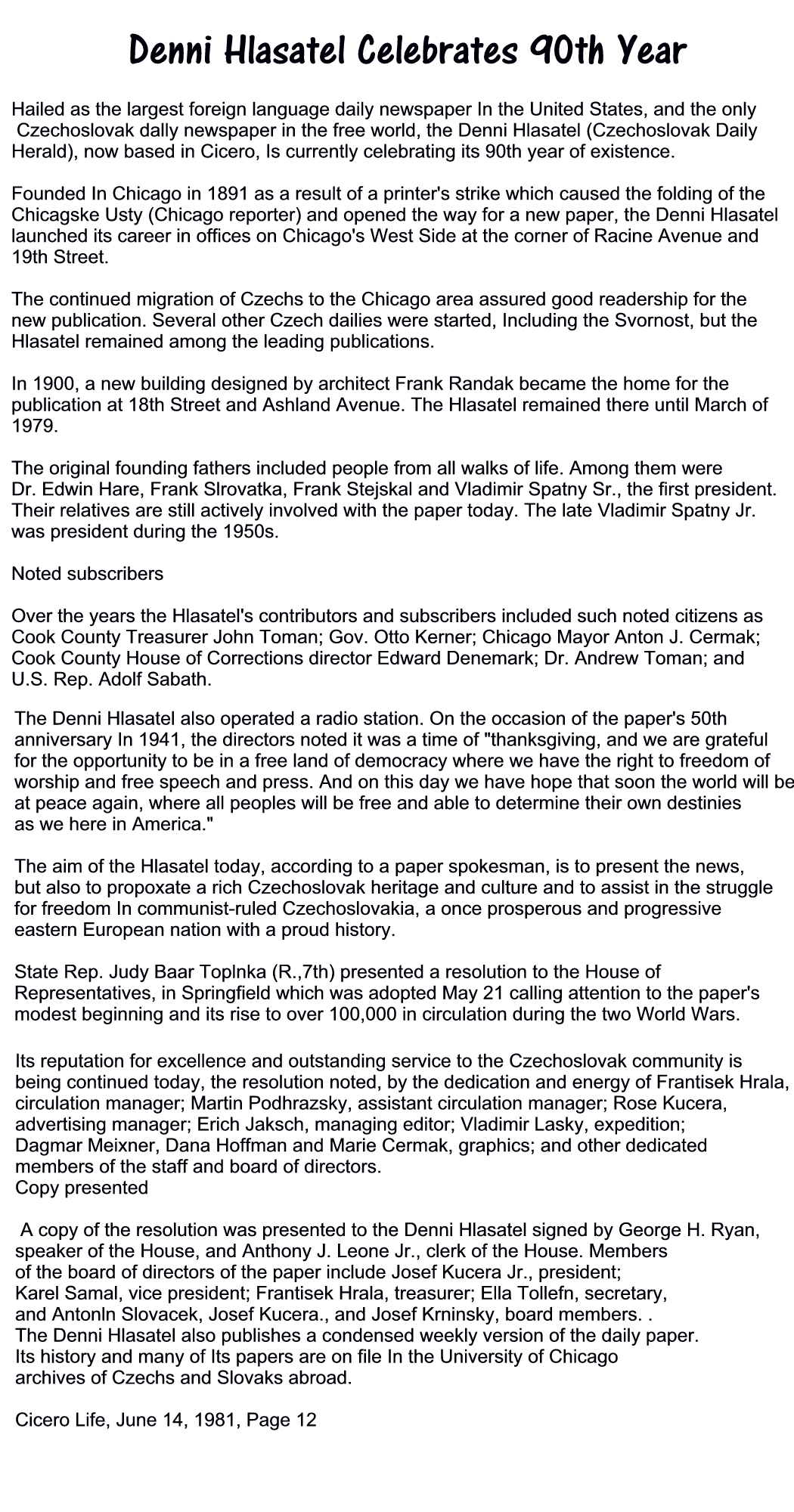
2010
Google Search "founding denni hlasatel newspaper"
Result: https://books.google.com/books?id=M2zPkciLtZcC&pg=PA134&lpg=PA134&dq=founding+denni+hlasatel+newspaper&source=bl&ots=gohs4ZYQjh&sig=ACfU3U3T5A3gv6xxbj5VZseFL0093hv-ng&hl=en&sa=X&ved=2ahUKEwiRsuK2x4HrAhVPG80KHTW9B4M4ChDoATASegQIChAB#v=onepage&q=founding%20denni%20hlasatel%20newspaper&f=false
The Ethnic Press: Shaping The American Dream - Leara Rhodes, 2010, Peter Lang Publisher, Page 134.
"The Czechs were divided by their religious or philosophical differences as well. An example of this was in Chicago. By the 1920's there were four main Czech - language newspapers in Chicago: the Narod (Nation, founded 1894) served teh Catholic community, Svornost (Concord, founded 1875) served the free thinkers, Spavedlnost (Justice, founded 1900) served teh socialists, and the Denni Hlasatel (Daily Herald, founded 1891) was a neutral paper for the larger midwestern Czech community (Gottfried, 1962)."
Excerpt From A Bachelor Thesis
https://theses.cz/id/0vg8yd/BP_Entlerov.pdf
"THE EMIGRATION OF CZECHS TO THE UNITED STATES OF AMERICA" - Kateřina Entlerová - 2012
DEPARTMENT OF ENGLISH AND AMERICAN
FACULTY OF ARTS
PALACKY UNIVERSITY IN OLOMOUC -
Pages 25 - 27 - "Countrymen's Press in Chicago"
"In the early 1890s there were two Czech daily newspapers coming out in Chicago, the aforementioned Svornost and Chicagské Listy.
The third Czech daily Denní Hlasatel was established in 1891.
The new daily newspaper, Denní Hlasatel,100 (the Daily Herald) was set up by the Czech Typographic Union which was established by the typesetters of Chicagské Listy, Svornost and Čechslovan101 (the Czechoslovak) on 7th December 1890. The Union was founded in order to advocate the interests of typesetters or typographers who worked under bad financial conditions. The Union demanded an eight-hour working day and a pay rise for the typesetters from the publishers of the aforesaid newspapers. But the publishers did not meet the Union’s demand which resulted in a strike of all Czech printing houses in Chicago on 1st May 1891. Despite this the publishers managed to keep issuing the magazines also due to the fact that many typesetters did not eventually participate in the strike. The striking typesetters felt the need to defend themselves in the eyes of public because they could have read only the publishers’ opinions in the magazines and thus, they started to issue their own leaflets from the Kerner’s publishing house on 18th Street.
But the typesetters moved from leaflets to a real newspaper and on the 4th May 1891102 they published the first issue of Denní Hlasatel. The newspaper was oriented on the working class but it was neutral to serve all groups and even though the paper was of freethinking nature, it did not “behave” in an anti-religious manner in contrast to other newspapers. This approach gained the paper a significant number of readers and Denní Hlasatel became the most wide-spread Czech paper in Chicago.
The founders consisted of approximately forty typographers. The name was suggested by F.J. Kuták, the chairman of the publishing house and a leading editor who emphasized the idea that the magazine must not be one-sided and must serve to all groups of people. The newspaper was initially printed by publishing companies of Kerner and Hildebrant (or Helebrant), situated on 19th and Brown Streets.
Already in the first months Denni Hlasatel overshadowed the two other dailies in the number of readers. Hlasatel also introduced new system of subscription that meant that people did not have to pay a monthly subscription but they paid weekly and they were thus allowed to buy the paper only when they wanted and when they had money. This new system brought new customers for Hlasatel and the number of readers had doubled in a short period despite the economic crisis. Concurrently with Denní Hlasatel, the Union had been publishing also Týdenní Hlasatel (The Weekly Herald) since 1892, which was transformed into semi-weekly newspaper since 1898. In 1899 the newspaper built its own building on Ashland Avenue and 18th Street. Denní Hlasatel operated until 1994.
Further development of the Czech press in Chicago (and in the United States as a whole) was influenced by the immigration quotas in 1920s which led to the falling numbers of new immigrants, also the “old” generation of immigrants was weakening and the new generation of Czechs in the States got Americanized. Apart from the shift in the identity of the Czech community, the development of the periodicals was also negatively influenced by the economic crisis at the turn of 1920s and 1930s. Such tendency continued even in the following decades. But it does not mean that the Czech newspapers would have completely disappeared. The Czechs kept issuing their newspapers and also founded new titles but only in lesser extent. We can observe that the similar situation affected also other areas, such as the development of Czech societies which will be mentioned in the following sub-chapter or the development of Czech schools.
Since 1994 when Denní Hlasatel ceased to exist, a weekly newspaper Nedělní Hlasatel (the Sunday Herald), which was a Sunday issue of Denní Hlasatel kept issuing in Chicago. From the email received on April 10, 2012 from the Chicago Public Library’s Ask Librarian service we learn that the issuing frequency had changed. “According to WorldCat,” a global catalogue of library holdings, “the newspaper switched its publication frequency in February of 1999, moving from a weekly to a semimonthly publication.” But only the information provided by the telephone service of the Center for Research Libraries in Chicago reveals that Nedělní Hlasatel, which was founded in 1891, published the last issue in April 2006 and ceased to exist."
Obituaries related to early Denni Hlasatel founders / editors
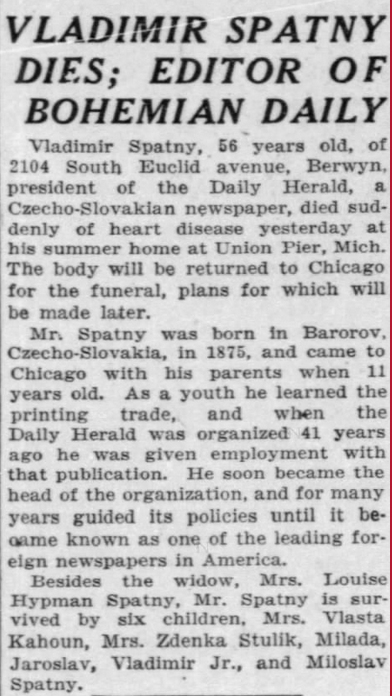
Chicago Tribune September 24, 1931, Page 16
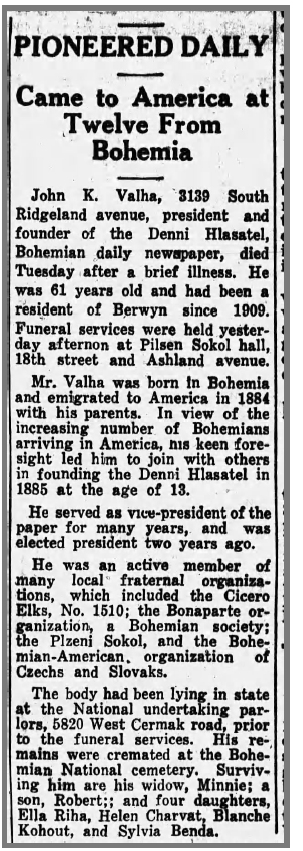
Chicago Tribune October 18, 1933, Page 18

Article Lists Frank Skala as a founder - Chicago Tribune July 25, 1937, Page 33
